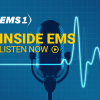Download this week’s episode on iTunes, SoundCloud or via RSS feed
Inside EMS Podcast co-host Kelly Grayson said a doctor friend once told him: 50 percent of what is taught in medical school is flat out wrong. But you don’t know which part is wrong until after the fact.
He and co-host Chris Cebollero encouraged EMS providers and students to speak up if “something doesn’t pass the smell test.”
“Just because someone paid me money to stand up there with a laser pointer and a power point presentation to teach you something doesn’t mean you should accept what I say without question,” Grayson said.
Too often, concepts remain unquestioned, and EMS urban legends gain the weight of facts. Grayson points out the story of a patient with mid-face trauma who wound up with a nasal endotracheal tube coiled up in his cranial vault.
“That’s a good one,” Cebollero said. “That’s the same video we’ve been watching since 1960.”
There’s a small risk it could happen, Grayson points out, but EMS needs weigh that with the benefits, and often using an endotracheal tube on someone with a skull injury is worth it.
“We were taught procedures, we were taught techniques and things to do, but we weren’t necessarily spending enough time on the thought process and critical thinking as to why those things were important,” Grayson said.
In the news
Cebollero and Grayson discuss a patient punched by Arizona firefighters who filed a claim for $11 million.
The fire chief apologized to the family, suspended the firefighters and ordered his crews to undergo training on how to deal with combative patients, but now with a potential lawsuit on the horizon it will be difficult for the department to put the issue to rest, Cebollero and Grayson said.
Cebollero said EMS needs to be professional, and not give someone a reason to sue.
“Let that be a lesson,” Grayson said.
Cebollero also talks about a fatal St. Louis air ambulance crash. Pilot Ronald Scott Rector was about to land at a Missouri hospital to pick up the medical crew when his helicopter crashed for unknown reasons.
“We have to be very cognizant of when we launch these helicopters,” Cebollero said. “We put these birds in the air for things that don’t need to be flown.”
As they’re trying to save people, they’re also putting their own lives at risk, and EMS providers need to make sure they’re ordering medflights when it really makes a difference.












